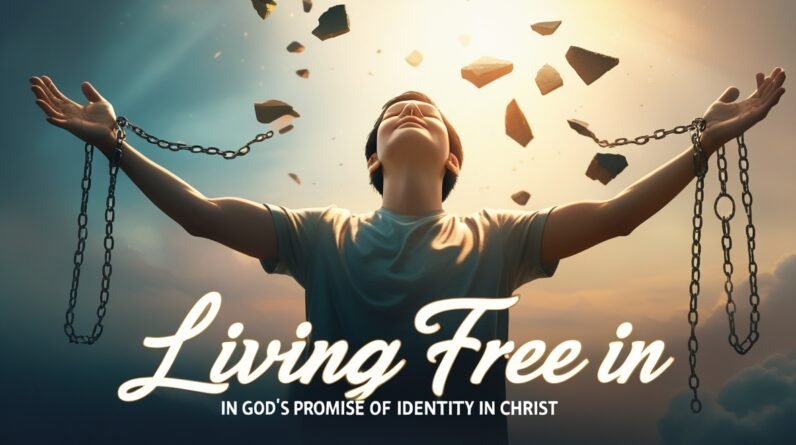7 Promises Of God That Define Your True Identity
You live in a culture that tells you who you should be, what you should want, and how you should measure success. But at the deepest level of who you are, nothing is more important than the truth God says about you. In this article, you’ll encounter seven promises of God that define your true identity in Christ, rooted in New Testament verses that reshape how you see yourself, your worth, and your purpose. These promises aren’t vague inspirational platitudes; they’re specific, personal declarations from Scripture that change the way you walk through life. By looking carefully at what God says, you begin to think differently, act differently, and live differently.
Why you need identity-shaped promises
When your identity is built on temporary things—your job, appearance, relationships, or accomplishments—you live with constant pressure to perform. God’s promises provide a firmer foundation. You’ll find that the promises of God anchor your heart when circumstances shift and your feelings betray you. This article will unpack seven of those promises, show you the verses that support them, and give practical ways to make them part of your daily life so that you stop pretending and start living from what God says is true.
How to read these promises
Approach each promise as if God is speaking directly to you. Read the linked New Testament verse slowly and aloud. Put your name in the sentence where appropriate. The promises are not theoretical; they’re relational. They’re meant to shape your thinking and choices. As you read, ask the Holy Spirit to make the truth real in your heart. And remember: knowing a promise intellectually is not the same as letting it transform you emotionally and behaviorally.
Promise 1 — You are God’s child
The very first place your identity changes is when you understand that you are a child of God. John writes that to all who receive Jesus and believe in his name, God gives the right to become children of God. Read and rest in this: you are not a spiritual orphan, you have a Father who cares, disciplines, protects, and adopts you into His family. John 1:12
This promise flips many common lies: you are not alone, you are not unloved, and you are not secondary. Your value does not come from performance or comparison; it comes from relationship. As a child of God, you have access to intimate conversations with the Creator. You can speak honestly with Him, tell Him your fears, your failures, and your hopes. Resting in this promise helps you stop pursuing identity through achievement and begin living out of secure belonging.
Promise 2 — You are adopted into God’s family
Adoption is more than a legal change; it’s a whole new relationship. Paul explains that through the Spirit you receive adoption, not as slaves but as children; you can call God “Abba, Father.” This promise means you belong permanently, with all the rights and privileges of sonship and daughterhood. Romans 8:15-17
When you embrace this promise, the way you relate to authority, to community, and to suffering changes. You receive the Father’s inheritance—spiritual benefits that are yours now and fully realized in eternity. Adoption also frees you from the fear-driven behavior that comes from trying to earn a place. Your identity is rooted in relationship, not performance. Let this truth guide you when you feel like an outsider or when rejection seems to define you.
Promise 3 — You are forgiven and redeemed
One of the most practical promises that defines who you are is forgiveness. In Christ you have redemption through His blood; God forgives you and cancels the record against you. That means your worst mistakes are not your final label. The gospel gives you a new starting point: you are forgiven and restored. Ephesians 1:7
Forgiveness alters your story. You are no longer trapped in shame or guilt. Instead of hiding from God or people, you can confess, receive grace, and move forward. This promise lets you accept yourself in the present while still growing toward who God is making you to be. Knowing you’re forgiven also empowers you to forgive others, which confers freedom in your relationships and furthers your healing.
Promise 4 — You are a new creation
God doesn’t just patch up the old; He makes you new. When you are in Christ, the old has gone, the new has come. This isn’t cosmetic improvement; it’s a fundamental change in your spirit and direction. You get a fresh identity that orients you toward life, hope, and purpose. 2 Corinthians 5:17
Understanding that you’re a new creation means you don’t have to be a slave to past patterns. Habits and histories may influence you, but they don’t define you. You are invited into daily renewal—moment-by-moment reliance on the Spirit to form Christlikeness within you. This promise frees you to take risks for good, to change, and to grow because your identity is based on who God is making you, not who you were.
Promise 5 — You are more than a conqueror
Life brings hardship, opposition, and suffering. Yet Scripture promises that in all these things you overwhelmingly conquer through Christ who loves you. This isn’t about heat-your-way-through life with self-effort; it’s the assurance that no trial can ultimately separate you from God’s love or His purposes for you. Romans 8:37
When you claim this promise, you stop defining yourself by your setbacks. Instead, you see trials as part of a larger narrative in which God is working all things for your good. Being “more than a conqueror” gives you courage to face fear, grief, and uncertainty with the confidence that God’s power is at work within you. That changes how you lead, love, and serve—even when circumstances are hard.
Promise 6 — You are chosen and holy
Peter speaks to your calling: you are a chosen people, a royal priesthood, a holy nation, a people belonging to God. This identity calls you to represent God in the world, to live differently so others can see God’s character through you. Being chosen is not about privilege alone; it’s about purpose—being set apart to reflect God’s holiness and goodness. 1 Peter 2:9
This promise gives your life dignity and responsibility. You are not average in God’s economy; you are purposeful. It empowers you to stand against cultural tides that would draw you away from righteousness. When you accept that you are chosen and holy, you make choices that honor God, you steward your influence well, and you seek to be salt and light in everyday situations.
Promise 7 — You are God’s workmanship, created for good works
The New Testament says you are God’s handiwork, created in Christ Jesus to do good works—works God prepared in advance for you to do. This confirms that your identity is not only relational but vocational: you have a design and a mission. God made you with particular gifts, passions, and opportunities to serve His kingdom in specific ways. Ephesians 2:10
Understanding yourself as workmanship helps you resist identity confusion that comes from trying to imitate others. You don’t have to force yourself into someone else’s calling. Instead, you discover, cultivate, and steward the unique combination of gifts God has given you. This promise also brings meaning to ordinary work—your job, family life, and community involvement become arenas where you live out God’s purposes.

How these promises reshape your everyday life
When you let these promises sink in, your choices begin to reflect your true identity. The promises of God identity change how you pray, how you face conflict, how you parent, and how you view success. Instead of chasing approval, you pursue obedience. Instead of finding worth in results, you find it in a relationship with God. When your identity is shaped by God’s promises, you live with calm resolve rather than frantic striving.
Practical implications include: you’ll measure success by faithfulness, not applause; you’ll find freedom to apologize and seek reconciliation because you know your worth is secure; you’ll use gifts instead of comparing them. The day-to-day rhythms of gratitude, confession, and serving anchor these truths and make them habitual.
How to make these promises yours
First, memorize the verses and say them over yourself. Replace negative self-talk with Scripture. When a lie comes, speak the truth aloud. Second, practice gratitude—thank God for the promises you’ve received and the evidence of them in your life. Third, find community—tell trusted friends what God is saying about you and ask them to speak those truths back into your life. Fourth, take small steps of obedience that align with your identity: serve in an area that uses your gifts, speak up for truth, or forgive someone who hurt you. Small acts of faith confirm that these promises are real and practical.
Also create rhythms that reinforce identity: daily Scripture reading, weekly communion or reflection, and seasonal retreats for recalibration. The promises of God’s identity are meant to be lived, not just admired.
Dealing with doubt and setbacks
You will have seasons when doubt storms your certainty. That’s normal. In those times, return to the promises like a child returns to a parent’s lap. Use the linked verses as anchors; read them aloud, journal how they apply, and ask a mature believer to remind you of the truth. Remember that identity is not primarily an emotional experience but a covenantal reality—God has declared you His, even if you don’t feel it. Be patient with growth; God often works slowly and steadily.
If you find persistent doubt tied to past trauma or deep shame, seek pastoral counseling or professional help. The promises of God’s identity are powerful, but sometimes healing requires wise support and therapeutic tools to remove barriers to belief.
Living these promises in community
Your identity in Christ is personal, but it’s also corporate. You belong to a body of believers who are called to reflect Christ together. When you encourage others with these promises, you reinforce them in yourself. Teach them to your children, speak them into the lives of friends, and model them in leadership. Churches that focus on the promises help people move from performance-based faith to grace-based living. You are invited to participate in a community that declares and demonstrates what God says about His people.
When you belong to a spiritual family, you get the benefit of correction, support, and shared mission. That’s essential because identity is lived out in relationship—not isolation.
How to pray these promises back to God
Prayer is a powerful way to internalize Bible truths. Take each linked verse, personalize it, and pray it aloud. For example: “Father, according to John 1:12, I receive the right to be Your child. Help me to live like it.” Praying Scripture aligns your heart with God’s heart and strengthens your conviction. Use a journal to record how God responds and the ways you begin to see change.
Confess a regular part of your prayer life so the promise of forgiveness is active and restorative. Thank God for adoption, redemption, new creation, and the calling to good works. When you pray from the Bible, you aren’t asking God to adopt your ideas; you’re letting God shape yours.
A short plan for the next 30 days
For the next month, focus on one promise per week, memorizing the verse, meditating on it, and practicing one corresponding action. Week 1: identity as God’s child—practice intimate prayer. Week 2: adoption—reach out and invite someone into friendship. Week 3: forgiveness—write a confession and release resentment. Week 4: new creation and works—try a new act of service. This rhythm gives you tangible ways to internalize the promises of God’s identity and watch them transform how you live in practical terms.
Repetition and small, consistent steps create lasting change more effectively than sporadic grand gestures.
Final encouragement
You aren’t what your past headlines say. You aren’t what anxiety paints. You are what God declares. The seven promises you’ve read are powerful because they come from a loving Father who knows you by name and has designed you for purpose. Keep returning to these truths. Let them reshape your goals, relationships, and daily habits. Over time, you will find that your actions follow the identity God has given you, and that freedom becomes a testimony to others. The transformation may not be instant, but it will be real.
Explore More
For further reading and encouragement, check out these posts:
👉 7 Bible Verses About Faith in Hard Times
👉 Job’s Faith: What We Can Learn From His Trials
👉 How To Trust God When Everything Falls Apart
👉 Why God Allows Suffering – A Biblical Perspective
👉 Faith Over Fear: How To Stand Strong In Uncertain Seasons
👉 How To Encourage Someone Struggling With Their Faith
👉 5 Prayers for Strength When You’re Feeling Weak

📘 Jesus and the Woman Caught in Adultery – Grace and Mercy Over Judgement
A powerful retelling of John 8:1-11. This book brings to life the depth of forgiveness, mercy, and God’s unwavering love.
👉 Check it now on Amazon
As a ClickBank Affiliate, I earn from qualifying purchases.
Acknowledgment: All Bible verses referenced in this article were accessed via Bible Gateway (or Bible Hub).
“Want to explore more? Check out our latest post on Why Jesus? and discover the life-changing truth of the Gospel!”








